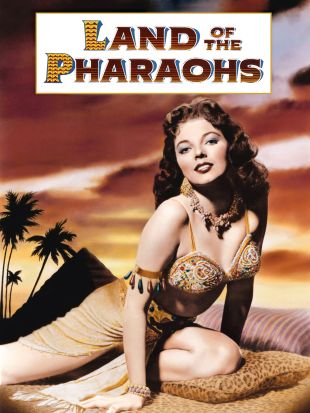This motion picture lodges in film history as one of the grandiose historical epics created between 1950 and 1960 to lure moviegoers away from a new form of entertainment -- television. Like other epics of that period, Land of the Pharaohs resorts to pomp and pageantry to lure audiences back to the silver screen. For example, the film opens with a spectacular cavalcade in which Pharaoh Khufu (also known to history by his Greek name Cheops) returns from war laden with gold and precious gems to sustain himself in the afterlife. Worried that grave robbers will steal his treasure, Khufu enlists thousands of laborers to construct a colossal tomb that will secure his body and his treasure for all time. Gigantic blocks of stone float on Nile barges to the construction site. Laborers promised a share in the afterlife tow the blocks across the desert with ropes. A rousing Dimitri Tiomkin score accompanies every tug and pull. Then the pyramid rises from the nothing of sand to into a mountain of rock scraping the firmament. Meanwhile, Princess Nellifer, the pharaoh's number two wife, plots to kill him, seize his treasure, and sit on the throne. Jack Hawkins as Pharaoh Khufu and James Robertson-Justice as pyramid builder Vashtar both perform capably. But it is Alexis Minotis as Khufu's loyal adviser Hamar who delivers the most memorable performance. Hamar is a small man with a big mind; he comprehends power, ambition, greed, and the necessity for diplomacy to navigate the crocodilian waters of Egyptian court life. Like a mirror, his eyes reflect all that is good and evil in Egyptian politics, but his ambiguous face yields only an occasional hint of the myriad opinions that never cross his tongue. Not all of the acting is praiseworthy. Dewey Martin is lackluster in his portrayal of Vashtar's son, and Joan Collins overacts as Nellifer. In addition, the script -- though partly written by William Faulkner -- is uninspired. Nevertheless, the film is good enough to command and hold the attention of the viewer as it presents ancient Egypt and 1950s Hollywood in all of their flawed glory.

Land of the Pharaohs (1955)
Directed by Howard Hawks
Genres - Drama, Action, Adventure |
Sub-Genres - Historical Epic |
Release Date - Jun 24, 1955 (USA - Unknown), Jul 24, 1955 (USA) |
Run Time - 103 min. |
Countries - United States |
MPAA Rating - NR
Share on